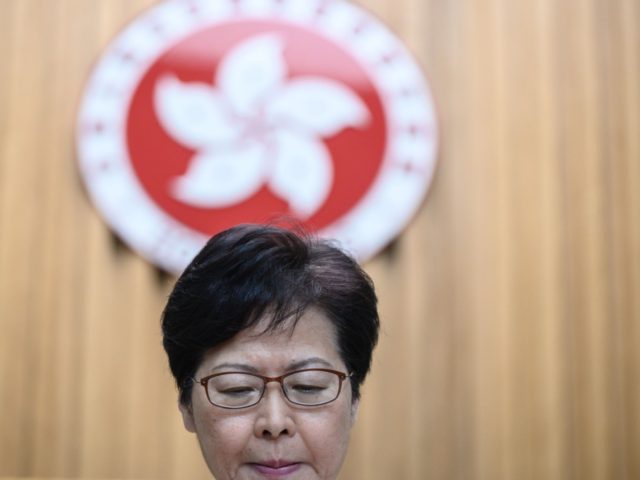Hong Kong Chief Executive Carrie Lam left for Beijing Monday morning to attend Tuesday’s scheduled festivities in honor of the 70th anniversary of communist China, leaving her city reeling after widespread police violence over the weekend.
Pro-democracy protesters took the streets on Saturday and Sunday, first for an event observing the five-year anniversary of the Umbrella Movement – the 2014 protests against China – and then on Sunday for an “illegal” protest urging global powers to oppose China’s crackdown on Hong Kong’s traditional democracy. Under the “One Country, Two Systems” policy, China agreed not to impose communism on the city in exchange for Hong Kong not seeking sovereignty.
The protest movement reemerged after nearly five years in June to oppose a legislative bill that would have allowed China to extradite anyone in Hong Kong, not just Chinese citizens, for violating communist law. Lam promised to withdraw the extradition bill, but protesters are still demanding freedom for political prisoners, direct election of lawmakers, an end to the government calling protesters “rioters,” and an independent probe into police brutality against protesters.
Lam left Hong Kong on Monday along with a reported 240-strong entourage of Hong Kong officials, police officers, and communist hangers-on who are expected to attend the massive October 1 parade that dictator Xi Jinping has organized. Lam is expected to play some role in the celebration, though it is not yet clear what Beijing has planned for her.
Her departure preceded the news, relayed by the South China Morning Post, that the decision to withdraw the controversial extradition bill was not hers unilaterally, but Xi Jinping’s. Although under “One Country, Two Systems,” Hong Kong’s chief executive should govern autonomously, the Post revealed, citing sources, that Lam reached out to Xi and asked permission before announcing that she would concede to one of the five demands. Lam spent months arguing that the legislature did not have to withdraw the bill because it was already “dead” – by which she meant tabled, in a state in which lawmakers could revive it at any time.
“The withdrawal of the bill is a crucial decision and, like appointments of principal officials in Hong Kong, it had to be approved by President Xi,” an anonymous source told the Post. “The Hong Kong government does not have much room to maneuver on options for handling the political crisis triggered by the bill as the central government considers it in the context of the US-China relationship. It’s no longer just a matter concerning the relationship between Hong Kong and the central government.”
Lam claimed when announcing the bill withdrawal that it was her decision to ask the legislature to take the bill out of potential debate.
Lam’s arrival in Beijing would follow that of at least ten Hong Kong police officers, also in town for anniversary celebrations. Among the delegation was Sergeant Lau Chak-kei, a notorious officer responsible for actively targeting protesters with beanbag rounds, who spent the weekend meeting with senior government agents. The Global Times, a Chinese government propaganda outlet, published a video of Lau meeting with its editor-in-chief and Fu Guohao, a Global Times “journalist” who received a $14,000 award for antagonizing Hong Kong protesters.
The South China Morning Post reported that the Hong Kong officers were treated to a tour of the Great Wall of China and a delegation of communist students applauding them upon their arrival at the landmark.
While some of Hong Kong’s most senior repressors were in Beijing this weekend, protesters took to the streets urging the world to join their call for China to respect human rights. Sunday’s “illegal” protest featured flags from all over the world and “thank you” signs to countries whose governments had warned China to heed the protesters. Police used tear gas, rubber bullets, and live gunfire against the thousands of people who peacefully assembled. In response, some protesters began throwing bricks and Molotov cocktails and police and setting up burning barricades.
This weekend’s protests reportedly resulted in over 100 arrests and 48 hospitalizations.
Hong Kong’s government refused to give the protesters a permit to assemble on October 1, the communist anniversary, citing the violence this weekend. Police were already forced to cancel the annual National Day fireworks last week, however, fearing that public celebrations of communism would attract protesters. Protest groups have vowed to take the streets anyway, using the occasion to highlight the horrors of communism before the world.
The Global Times continued its campaign to smear the pro-democracy movement on Monday, accusing the “young radicals” of “attacking police officers, damaging public property, and vandalizing government buildings.”
“Months of protests have deprived people’s freedom and rights to a normal life, and now radicals are depriving Hong Kong residents from celebrating the anniversary of the People’s Republic of China, which cannot be tolerated at all,” the Global Times claimed, citing a statement from the Hong Kong Federation of Trade Unions, a special interest group that often aligns with Chinese interests.

COMMENTS
Please let us know if you're having issues with commenting.